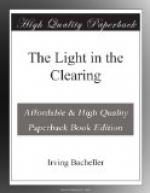There were the singing and spelling schools and the lyceums, but those nights were few and far between. Not more than four or five in the whole winter were we out of the joyful candle-light of our own home. Even then our hands were busy making lighters or splint brooms, or paring and quartering and stringing the apples or cracking butternuts while Aunt Deel read.
After the sheep came we kept only two cows. The absence of cattle was a help to the general problem of cleanliness. The sheep were out in the fields and I kept away from them for fear the rams would butt me. I remember little of the sheep save the washing and shearing and the lambs which Uncle Peabody brought to our fireside to be warmed on cold mornings of the early spring. I remember asking where the lambs came from when I was a small boy, and that Uncle Peabody said they came from “over the river”—a place regarding which his merry ignorance provoked me. In the spring they were driven to the deep hole and dragged, one by one, into the cold water to have their fleeces washed. When the weather had warmed men came to shear them and their oily white fleeces were clipped close to the skin and each taken off in one piece like a coat and rolled up and put on the wool pile.
I was twelve years old when I began to be the reader for our little family. Aunt Deel had long complained that she couldn’t keep up with her knitting and read so much. We had not seen Mr. Wright for nearly two years, but he had sent us the novels of Sir Walter Scott and I had led them heart deep into the creed battles of Old Mortality.
Then came the evil days of 1837, when the story of our lives began to quicken its pace and excite our interest in its coming chapters. It gave us enough to think of, God knows.
Wild speculations in land and the American paper-money system had brought us into rough going. The banks of the city of New York had suspended payment of their notes. They could no longer meet their engagements. As usual, the burden fell heaviest on the poor. It was hard to get money even for black salts.
Uncle Peabody had been silent and depressed for a month or more. He had signed a note for Rodney Barnes, a cousin, long before and was afraid that he would have to pay it. I didn’t know what a note was and I remember that one night, when I lay thinking about it, I decided that it must be something in the nature of horse colic. My uncle told me that a note was a trouble which attacked the brain instead of the stomach. I was with Uncle Peabody so much that I shared his feeling but never ventured to speak of it or its cause. He didn’t like to be talked to when he felt badly. At such times he used to say that he had the brain colic. He told me that notes had an effect on the brain like that of green apples on the stomach.
One autumn day in Canton Uncle Peabody traded three sheep and twenty bushels of wheat for a cook stove and brought it home in the big wagon. Rodney Barnes came with him to help set up the stove. He was a big giant of a man with the longest nose in the township. I had often wondered how any one would solve the problem of kissing Mr. Barnes in the immediate region of his nose, the same being in the nature of a defense.




